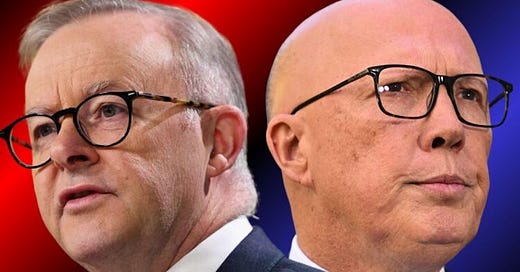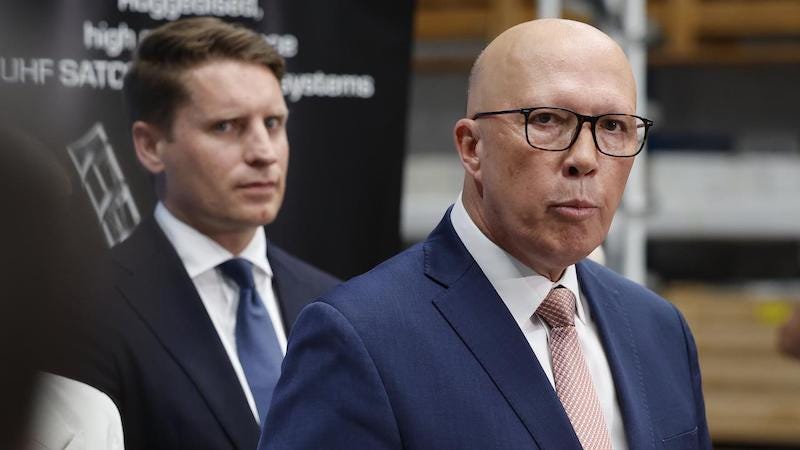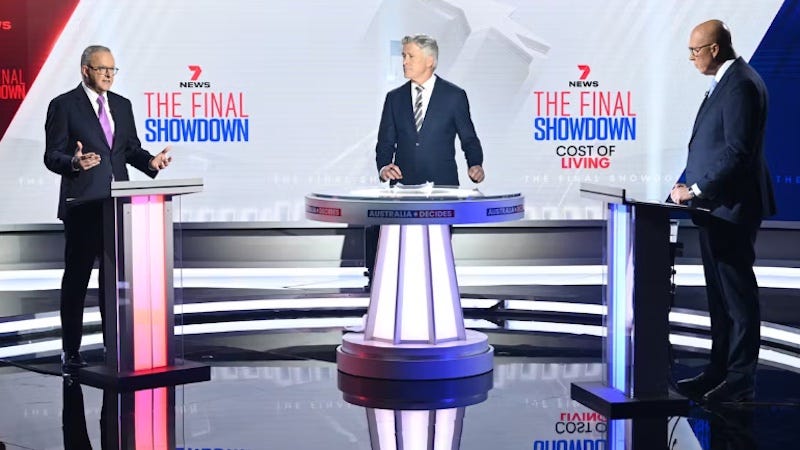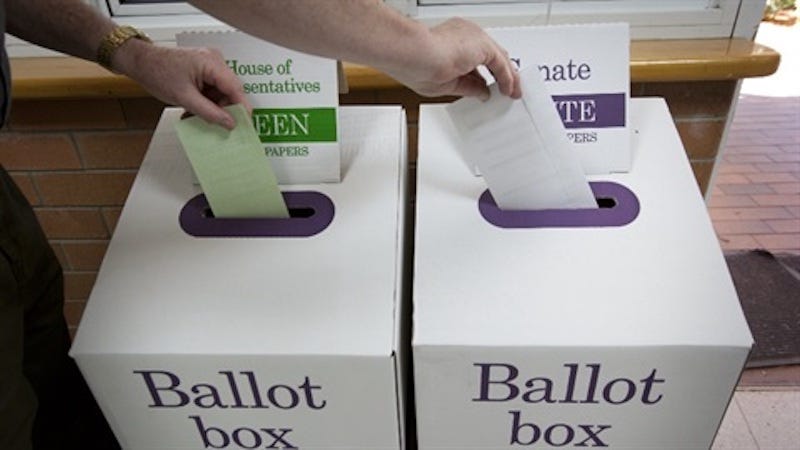A strange, disjointed week in a campaign slipping away
The question now is whether the Liberal Party can avoid an even more catastrophic result than expected.
The fourth week of the federal election campaign was quite a bit different – a strange, fragmented few days and a disjointed rhythm. With Easter Monday and ANZAC Day to start and end the week, there were just three formal campaigning days in between, and these were overshadowed by the major global event of the death of Pope Francis. While almost 40 per cent of Australians now hold no religious affiliation and only 20 per cent identify as Catholic, the Pope was an international figure of stature, and his death subdued the campaign atmosphere, making an already difficult task for Peter Dutton even more difficult. Campaigning lost its energy, major events were paused, and both Anthony Albanese and Dutton suspended their activities to attend church – a truce in an otherwise relentless campaign.
Early pre-poll voting began on the Tuesday, which signified a major change in the campaign – the election was no longer a theoretical exercise; no longer just about changing minds; the election was suddenly very real with real votes being lodged. A record 542,000 Australians cast their votes on the first day of pre-polling, with around two million by the end of the week – meaning that by election day on May 3, close to half the electorate will have already made their voted. This change in recent times from an election day to an election period – voting stretched across two weeks – makes it more difficult for all candidates to sustain momentum, but it does rewards discipline, consistency and energy.
This was always going to be a Coalition campaign running against the tide – a challenger needs a clean path to build their momentum: a routine, a rhythm, a clear run of days to hammer home messages and shift voter sentiment. Instead, the Coalition had to deal with a messy timetable – school holidays, two long weekends, public holidays, and now the death of a global religious leader. A campaign that already stumbled through its first three weeks was thrown further into disarray just at a time when it needed to be coherent.
Of course, such a disjointed timetable also impacted the Labor Party, but as the incumbent and the frontrunners, they didn’t need to build a momentum for change: Albanese didn’t need to convince an electorate of change – he just had to reassure them that stability was preferable to risk. And while dissatisfaction with Labor has been simmering, there doesn’t seem to be a ‘change the government’ mood in the air. That time may come by 2028 if Albanese becomes even more disliked than he is now, and if the Liberal Party can provide a credible leader, but that point hasn’t arrived yet. In contrast, Dutton faces mounting problems not just with voters, but within his own party. Leaks have been flowing directly to Labor strategists, bypassing the media entirely – a clear sign that many in the Liberal ranks have lost faith in their leader.
In a campaign week where building a momentum was absolutely critical, the Coalition found itself stranded by events outside its control and by its own ineptitude. The question now isn’t whether Dutton can pull off a miracle comeback in this final week – it’s about how the Liberal Party can lessen the expected loss, and whether they can avoid an even more catastrophic result than expected.
The Coalition campaigns on defence, but the message misfires
As the Coalition struggled to find footing during this week, it turned to what it believed was one of its few remaining strengths: defence policy. In Perth, Peter Dutton and shadow defence minister Andrew Hastie announced a $21 billion boost to defence spending, framing it as essential to Australia’s national security and regional stability, and the “single most important task for the Australian government is to keep the Australian people safe”, positioning this as an imperative for maintaining alliances and deterring threats.
Yet while playing to perceived strengths is a textbook campaigning tactic, the Coalition’s defence pitch exposed further problems within its election strategy. The announcement lacked depth, offering little detail beyond big-ticket spending figures and a parade of militaristic slogans. There was no discussion about veterans’ services, no proposals for reforming the ADF’s outdated structures, and no vision for modernising the force to meet the complex, non-traditional threats of the 21st century. Missing too was any reflection on Australia’s strained regional relationships – and how careless diplomacy under Dutton’s previous time in office as defence minister, including recent inflammatory remarks about Indonesia and Russia, has jeopardised Australia’s standing in the region.
Even more baffling is how Dutton proposed to fund this $21 billion spend: reversing Labor’s HECS debt reduction policy, scrapping subsidies for electric vehicles, and reversing tax cuts promised by the Labor government – hardly a recipe for electoral success. Few voters, irrespective of income bracket, want to surrender tax relief for the promise of more F-35 fighter jets or military hardware, particularly when trust in defence procurement is low after years of scandals, blowouts, and wastage.
Dutton then went down yet another culture war cul-de-sac, pushing for anti-Semitism questions to be added to the Australian citizenship test and suggesting a new round of scrutiny of existing Palestinian visa approvals. These were naked appeals to the Zionist lobby and attempts to wedge Labor on national security, but again, they felt out of step with the current priorities of the electorate: cost-of-living pressures, health, housing, and education dominate voter concerns – not heavy-handed changes to citizenship tests or ethno-political dog-whistling.
It is true that the Liberal Party has historically polled better on defence, economic management, and border security but as the years have rolled on, that reputation has become frayed. The myth of Coalition superiority on economic management has crumbled in the face of Labor’s record in office: the evidence suggests that the Liberal Party is not the better economic manager, yet the perception persists. On border security and immigration, Dutton’s heavy-handedness has alienated moderate voters and reinforced an image of cruelty over competence.
Defence remains as the last symbolic refuge – but even there, the Coalition’s approach is intellectually thin and politically tone-deaf. It focuses on spending billions with no accompanying narrative about how Australia can genuinely strengthen itself without alarming neighbours such as Indonesia or inflaming tensions in a volatile world.
Instead, Dutton’s defence policy feels trapped in a 20th-century mindset – obsessed with the boys’ toys and geopolitical sabre-rattling – while Australia’s real needs in the Indo–Pacific era demand a far more thoughtful, deft, and forward-looking approach. Hastie’s military background might lend credibility to these announcements, but experience in combat does not necessarily translate into strategic wisdom in procurement, diplomacy, or military reform.
Ultimately, this defence announcement revealed more about the Coalition’s weaknesses than its strengths. It highlighted a party unable to adapt to modern campaigning realities, unable to read the room, and increasingly speaking to a shrinking, aging base that wants to hear that everything can be solved by spending on fighter jets and tightening immigration controls: it felt less like a bold and enticing move and more like a desperate one.
More leaders’ debates, but where’s the inspiration?
This week has two debates – Nine/Fairfax’s The Great Debate and Seven West’s The Final Showdown – and both delivered what was to be expected: tightly controlled, stage-managed events that offered more of the same arguments in slightly different packaging. In more direct formats, both Albanese and Dutton faced a series of timed questions from political commentators and moderators, and forced to answer in a strict window of 60 seconds. These tighter formats did inject some energy, but the substance remained predictable, and the debates quickly descended into the same familiar campaign themes.
Perhaps the most revealing moment of The Great Debate came not from the leaders but from moderator Ally Langdon – a theme also picked up by The Final Showdown – who asked why neither leader was inspiring the public. Neither Albanese nor Dutton could convincingly answer it, because both major parties – and the media structures that cover them – have long abandoned the idea of truly inspirational politics. In today’s Australia, political courage is punished, not rewarded; big, community-centred ideas are demolished by corporate media before they can ever take hold.
What would inspirational leadership even look like? Not another round of tax cuts for the wealthy or shallow slogans about choice and opportunity, but bold systemic changes: super-profits taxes on mining giants such as Gina Rinehart or Andrew Forrest, free higher education and dental care, massive investment in public housing, demilitarising Australia’s foreign policy, rebuilding a genuine sense of national community. But such policies are anathema to the neoliberal orthodoxy that both major parties largely accept and the mainstream media vigorously promotes. Instead of collective inspiration, politics now focuses almost entirely on individual aspiration, ignoring the social contract in favour of a perpetual rat race and a fear of missing out.
This is the tragedy underlying Australian democracy today: a political culture so dominated by market dogma and corporate media interests that even modest reforms are treated as radical, and the language of collective responsibility is increasingly absent from the national conversation. Political debates, as a result, have become risk-averse exercises in messaging discipline, not moments of inspiration: leaders don’t inspire anymore because they’re not trained to do this.
It’s not that individual ambition and entrepreneurialism have no place – they do, and can flourish within a broader social framework. But without public investment, functioning health and education systems, decent infrastructure, and a vibrant middle class, individual success stories are nothing but shallow myths. Even billionaires owe their fortunes to collective efforts – roads, education systems, stable governments and other people – which they rarely acknowledge until their fortunes are at risk and they plead for bailouts.
These two debates, while marginally sharper than the previous two, ultimately changed little. Albanese reiterated his focus on health, Medicare, education, and the promise that “no one will be held back and no one left behind,” a refrain from his 2022 campaign. Dutton stuck to crime, law and order, and defence – ground he has retreated to repeatedly throughout this campaign. The media in The Great Debate declared Dutton the winner by a margin of two to one – the studio jury in The Final Showdown was far more comprehensive for Albanese, registering 50 per cent in favour, to Dutton’s 25 per cent – but winning or losing a debate in the dying weeks of a campaign, means little when much of the electorate has already voted, or made up their minds long ago.
And in truth, winning these debates has little bearing on winning elections. History is littered with leaders who dominated debates but lost at the ballot box: Kevin Rudd against Tony Abbott in 2013, Julia Gillard against Abbott in 2010 (that resulted in a minority government), Bill Shorten against Scott Morrison in 2019. These sterile, tightly managed performances don’t sway elections – they just provide momentary grist for media spin cycles and a few viral clips for social media.
The opinion polls continue to provide bad news for the Coalition
A new round of opinion polls released this week has crystallised what has been obvious for some time: the Labor government is pulling ahead, and the Coalition is falling further behind. The Morgan poll showed the most dramatic movement, giving Labor a commanding 55.5 per cent to 44.5 per cent two-party-preferred lead over the Coalition – a gap that, historically, no opposition has ever managed to overturn in the final week of a campaign. YouGov and Newspoll results showed similar patterns, indicating not just a drift towards Labor, but a hardening of voter sentiment as pre-poll voting continues.
Comparisons with the 2022 election show that at the same stage in the campaign, the numbers are almost identical. Although opinion polls can never guarantee the final result – as the 2019 election proved – the current dynamics are even more daunting for the Liberal Party. Unlike 2019, where voters harboured deep doubts about the leadership of Bill Shorten, there is no clear rejection of Albanese. And unlike Scott Morrison’s last-minute surge in 2019, Dutton has no pool of goodwill to draw upon: there’s just not much there. His belated attempts at softening his image have come too late and too inconsistently to have any real impact.
It’s often said during election campaigns that it’s never over until it’s over, but even seasoned political observers are scraping the bottom of the barrel trying to imagine a scenario where Dutton can pull off a reversal. Even traditionally hostile media outlets such as Sky News are struggling to put a positive spin on Dutton’s performance, with some conservative commentators openly acknowledging the Liberal campaign has been a disaster.
Dutton has missed the opportunity not just to win government, but to position the Liberal Party credibly for the next election. Throughout the campaign, Dutton has oscillated between two personas: the aggressive ex-cop who seems constantly one question away from snapping, and the awkward, softer image briefly glimpsed during the debate after the death of Pope Francis. But even when Dutton tried to project calmness, it felt strained, temporary, and at odds with his broader political identity. The day after the debate, he reverted to form – aggressive, combative, defensive, and belligerent when challenged by journalists.
This inability to consistently reframe his public persona is a major failing, especially when it has been obvious for years that the ‘hard man’ image is almost impossible to sell to a broader Australian electorate. Dutton had nearly three years to soften his edges, to offer a new, more constructive vision. Instead, he remained trapped by his past, and by a party apparatus either unwilling or unable to modernise itself.
A system in desperate need of renewal
As the federal election campaign enters its final week, the overall picture has become clearer: a more energised although cautious Labor government seems to be veering towards re-election, and a disjointed and disorganised Coalition struggling to remain relevant. It has been a lugubrious and turgid campaign in many ways, defined more by what was left unsaid than by bold promises or visionary ideas. Yet within that, the broader currents of Australian politics have been exposed – a deep aversion to risk, a media and political system reluctant to engage with real change, and a widening disconnect between the political class and the communities they are meant to serve.
The issues that have been ignored during this campaign – Indigenous justice, climate change, poverty, homelessness, gambling reform, structural inequality – will not vanish after the election. They will grow and eventually demand political attention, whether today’s leaders are prepared for it or not, and whether they like it or not. This campaign has been a missed opportunity to address these issues; to lay the foundations for a renewed, fairer Australia. Instead, the political establishment has offered a holding pattern, a rearguard action against change rather than a bold leap towards it.
If Labor is returned to government, which according to all published opinion polls is the most likely outcome, the pressure will shift. An electorate that may have reluctantly endorsed stability this time around will, over the coming years, demand more: more ambition, more action, more courage. If Albanese’s government fails to deliver it, a new generation of independents, minor parties, and community movements will rise to fill the void.
Australian politics is changing – slowly, unevenly, but inevitably: the old party duopoly is weakening. The demands for structural reform, democratic renewal, and genuine social progress are growing louder. This election might not be the evolution many have hoped for, but it may provide another small step towards a different political future – one where inspiration is not a dirty word, and where government is about building something bigger than the sum of its political calculations.













A speaker at the Avalon, Sydney, Anzac Day service said 5000 veterans are homeless. However, neither Albanese nor Dutton has apparently shown any interest in housing homeless veterans, among their talk of higher defence spending.
Dutton's talk of buying more F-35s goes against the trend to withdraw from defence dependence on the USA, which Trump has made an unreliable ally.
Dutton's racism also came out today, firstly by falsely accusing the Greens of being anti-Jewish, and then accusing the ABC and The Guardian of spreading hate because they have covered Israel's atrocities against Palestinians.
Dutton just made himself look extreme, like Trump.
Dutton also said 'Welcome to Country' ceremonies should be dropped from Anzac Day services, which was a mistake as it identified him with the racists who interrupted the dawn service in Melbourne.
And Dutton's credibility was further dented by the ABC's report Dutton had failed to declare his share in a family trust which earned $millions from childcare centres, including government funding.
So Dutton's reputation just keeps sinking, as did Morrison's at the previous elections. Will Dutton lose his own seat of Dickson? Two percent is only a small margin if a swing is on.
Albanese has benefited from Australians' rejection of Trump. Albanese looks safe and competent, which helps, and his government has a solid record of real achievements which take time to bring about real change.
But that may not work at the 2028 elections, when Trump should be gone or in prison and Australians may want a more progressive agenda.
Chalmers may have succeeded Albanese by then and might decide to take a bolder agenda, including capital gains and business tax reforms, to the people.
Dutton may have been dumped by then, but no-one on the Coalition side seems to have the quality to do any better as Opposition Leader.
So a Chalmers-led Labor Government could win another term, thanks to Dutton's failures this time.